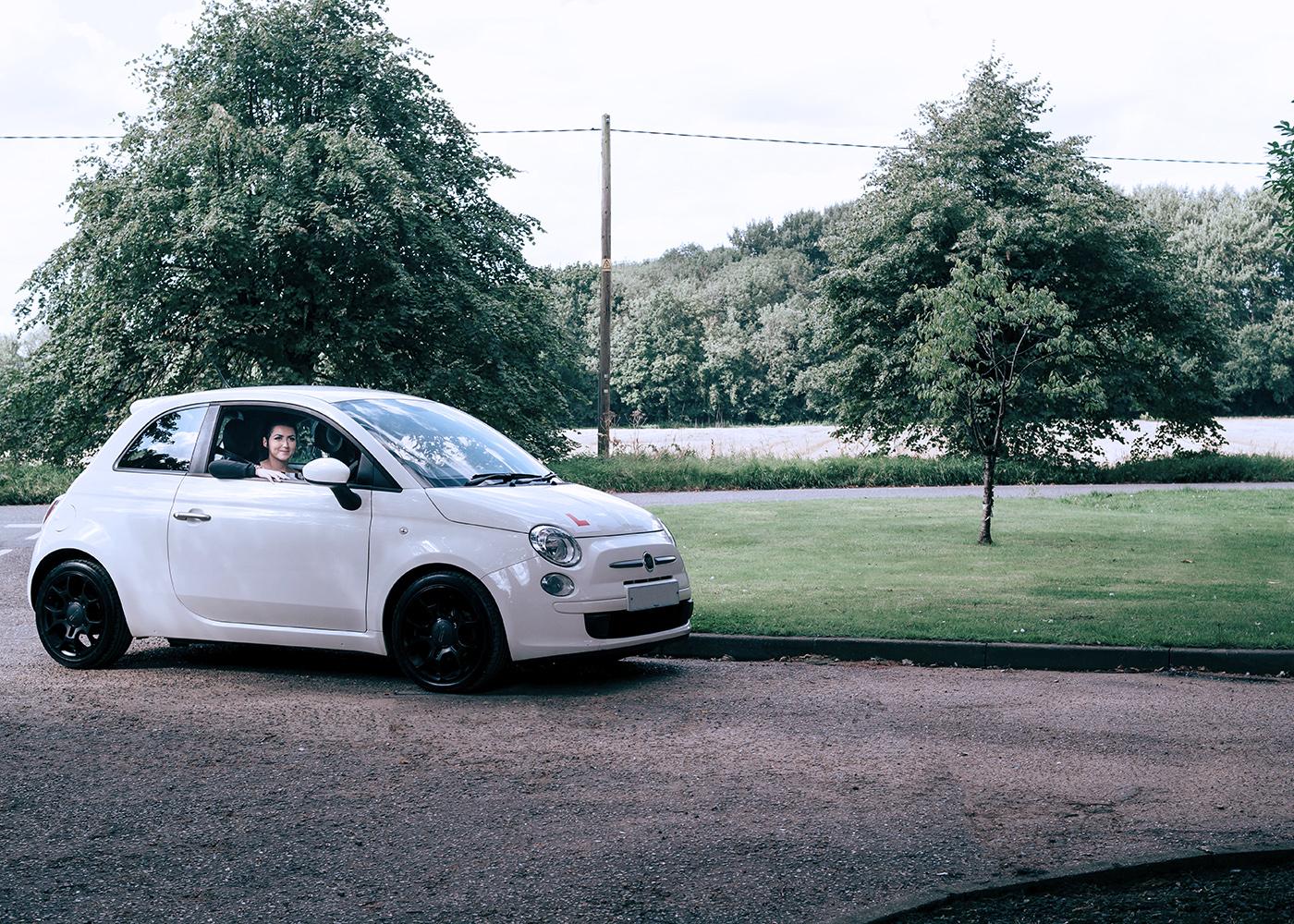From paying for your licence to booking your test, learning to drive comes with a big price tag. This article will explain how much you (or your parents) will need to fork out before you can call yourself a qualified driver. It also offers tips for saving money on one of the most expensive parts of learning to drive – the lessons!
How much does a provisional licence cost?
A provisional licence is £34 if you apply online, or £43 if you would prefer to complete a postal application. While you can’t learn to drive until you’re 17, you can apply for a licence at any time after turning 15 and 9 months – a good way to spread the costs.
The only other requirement for getting a provisional driver’s licence is that you must read a car number plate at a distance of 20 metres. If you can’t, you’ll need to get yourself an eye test and corrective lenses.
How much do driving lessons cost?
Driving lessons cost about £26 per hour, although this will vary depending on where you are in the UK and when you take your lessons (evenings and weekends may cost more).
Here are example costs from around the country:
| Location | Cost Per Hour |
|---|---|
| Derry | £24 |
| Belfast | £24 |
| Aberystwyth | £24 |
| Cardiff | £25.50 |
| London | £26 (£30 on evenings and weekends) |
| Inverness | £26 |
| Edinburgh | £28 (£30 on evenings and weekends) |
| Carlisle | £33 |

How many driving lessons do I need?
According to the Driver and Vehicle Standards Agency (DVSA), it takes most people around 45 hours of lessons and 22 hours of additional practice (see below) before they are ready to take their test. That means that you’re looking at around £1,260 – unless, that is, you find a way to save money on driving lessons. Luckily, we’ve got some tips for you.
How can I save money on driving lessons?
There are plenty of options for saving money on your driving lessons, including:
- 2-hour driving lessons – many instructors will offer two hours of tuition at a saving of up to 10% if taken as a single lesson.
- Buying in bulk – if you can afford to pre-pay for 5, 10 or more hours of tuition in one go, you’ll find it saves you a lot of cash. From a quick search online, we found 10-hour blocks a whopping 25% cheaper than paying per hour-long lesson.
- Introductory offers – if you’re completely new to driving, then you can take advantage of the many discounts offered for first-timers. One driving school will knock £15 off a 10-hour block booking for complete beginners, another offers £30 off a 5-hour booking for new customers.
- Intensive driving courses – an intensive driving course is where you take all your lessons in a short period of time. The cost per lesson is usually a similar price, but by taking them in a short space of time, you’ll probably need fewer hours of practice before taking your test – you’re less likely to forget what you’ve learned between your lessons. If an intensive course of 25 lessons costs £600 and readies you for the test, you could be saving more than 50%.
- Vouchers – discount websites like Wowcher and Groupon claim to offer deals that can save you as much as 70-80%. You should bear in mind that these deals will only cover a certain number of lessons, after which you will pay full price.

How much does a driving theory test cost?
The car theory test, which you can book online, costs £23. Fewer than 50% of people taking a theory test actually pass. In fact, the pass rate has been declining for the past 10 years.
As such, we recommend that you revise and take practice tests, to try to ensure you only have to pay for your theory test once.
The test is split into two sections. The first asks you multiple-choice questions based on:
- The Highway Code
- Know Your Traffic Signs
- The Official DVSA Guide to Driving – the essential skills book.
You can buy these books from high-street bookshops or online, and they will cost you about £22.50. You can also find free or low-cost apps if you’re hoping to save money – it depends how you prefer to learn.
The second part of the theory exam is the Hazard Perception test, which is where you watch short videos and click when you see hazards. The DVSA has a practice test available online and the cost depends on how long you want to have access to it:
- £7 for one week
- £10 for one month
- £14 for three months
- £25 for one year
Once you’ve passed your theory test, you have two years to pass your driving test. After this point you’ll need to retake your theory, so only take it once you’ve started driving lessons – your instructor can advise when you’re ready.

How much does it cost to practise driving outside lessons?
As mentioned above, it takes about 22 hours of practice on top of your driving lessons before you’re ready to take a practical test. If you’d like to drive your own car, or more likely that of a friend or relative, you’ll need to bear in mind the costs associated with this.
You’ll need insurance to practise driving between your lessons. One option is to be added to an existing policy – such as your parents’ – as a named driver, but this can be pricey. A better option is to buy learner driver insurance, a specialist insurance offering temporary cover for people with a provisional licence. This can save you as much as £750.
Learner driver insurance can cost less than 65p per day for an annual policy. Your premium will depend on the length of time you want cover as well as factors like the type of car you’ll be driving. For learner policies taken out through Adrian Flux, the average cost is about £250.
Don’t forget, the car you’re driving must have L plates clearly displayed. You can get these as stickers or magnets, and they will set you back about £2 to £5 depending where you buy them. You can buy them in most supermarkets and auto retail shops.
Depending on your circumstances, your parent or another supervisor may expect for you to contribute towards the cost of petrol. The average cost of fuel in the UK is 130.9 pence per litre for petrol and 133.7 pence per litre for diesel (September 2018). At these prices, filling up a small (40 litre engine) car would cost around £52.40 or £53.60.
Read our guide for information about supervising a learner driver.
How much does a driving test cost?
The car driving test costs £62 during the week or £75 if you want an evening or weekend slot. You’ll also need to pay your instructor for the loan of his or her vehicle. This is usually about double the usual cost of a one-hour lesson but often includes some last minute practice before the test.
According to DVSA data, the first-time pass rate for drivers is 46.7%, although for those between 17 and 25, this increases to 49.3%. Unfortunately, these statistics mean that you’re more likely than not to fail on your first attempt, so make sure you budget for a second attempt.
To maximise your odds of passing, it’s essential to only take a practical test when your instructor says you’re ready. The following list of most common reasons people fail their tests is also helpful – take note and don’t make the same mistakes!
- Lack of observation at junctions
- Not looking in mirrors before changing direction
- Poor steering control
- Turning right at a junction without following the proper process
- Incorrect road positioning
- Control and safety when pulling away
- Failing to respond appropriately to traffic lights and signs
- Lack of control during a reverse park (control)
Read more: Our guide to passing your driving test
What’s the total cost of learning to drive?
| What | Cost |
|---|---|
| Provisional licence (applied for online) | £34 |
| Driving lessons (45 hours) | £1,170 |
| Study materials for theory test | £22.50 |
| Access to hazard perception practice site (1 month) | £10 |
| L plates | £5 |
| Learner driver insurance (average policy cost) | £250 |
| Driving test (weekday/daytime) | £62 |
| Total | £1,576.50 |
What are the costs once you’ve passed your driving test?
Before you can hop into a car and drive off into the sunset, you need to make sure you’re covered. Even if you already have a policy as a learner, you must tell your insurer that you’ve passed your test or you may not be covered in the event of an accident.
As you no longer need to be supervised by an experienced driver, you’ll see an increase in your premium. In August 2018, the average annual black box policy at Adrian Flux was £1,485. Bear in mind that your insurance may be higher or lower depending on factors such as your age, the car you’re driving, whether anyone else drives the car, etc. Read our article on finding cheap car insurance as a new driver.
As long as you’ve sorted your insurance, you can drive without supervision as soon as you pass your practical test – though you’ll still need to apply for a full licence. The good news is that there is no fee for upgrading from a provisional to a full driving licence! Unless, that is, you’d like a new photo, in which case you’ll need to pay £17 for the privilege.
One item some new drivers like to buy is P plates, or ‘probationary’ plates. These cost about the same as L plates (about £2 to £5). The plates warn other drivers that you’ve recently passed your test and to be patient while you’re getting to grips with everyday driving. They are optional in England, Wales and Scotland.
In Northern Ireland, R plates (‘restricted’ driver plates) must be shown for one year after you pass your test – they cost about the same as L and P plates.
Interested in learning what it’s like learning to drive? Read our interview with Sophie, who describes her first experience behind the wheel.
Prices correct September 2018.
Get learner driver insurance from Adrian Flux
If you’re looking for affordable learner driver insurance to cut the costs of learning to drive, call us on 0800 369 8590 or book a callback at a time that suits you.

